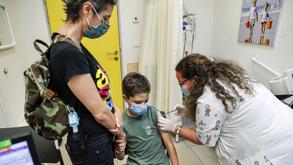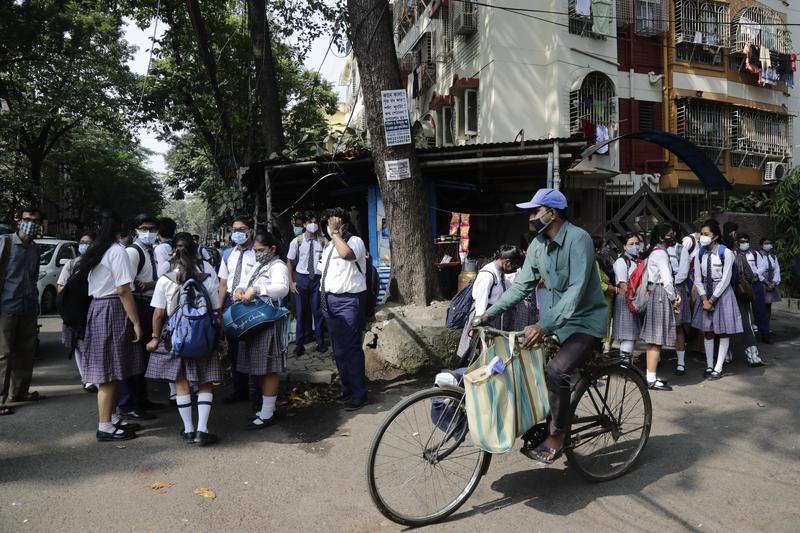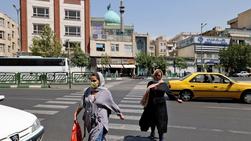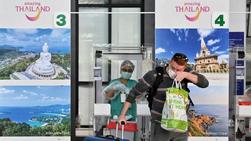
A boy receives a dose of the Pfizer/BioNTech COVID-19 vaccine at the Clalit Healthcare Services in the Israeli city of Holon near Tel Aviv on June 21, 2021, as Israel begins coronavirus vaccination campaign for 12 to 15-year-olds. (JACK GUEZ / AFP)
CANBERRA / ISLAMABAD / JAKARTA / JERUSALEM / NEW DELHI / SINGAPORE / SYDNEY / TEHRAN / WELLINGTON / YANGON / VIENTIANE - Israel began rolling out Pfizer/BioNtech COVID-19 vaccinations for 5- to 11-year-olds on Monday hoping to beat down a recent rise in coronavirus infections.
A fourth wave of infections that hit Israel in June began subsiding in September. But over the past two weeks the "R", or reproduction rate of the virus, that had remained below one for two months began climbing and has now crossed that threshold, indicating the virus could again be spreading exponentially.
Daily cases have also crept up over the past few days, with half the confirmed infections presently among children age 11 and younger.
The children's vaccine drive kicked off on Monday in a Tel Aviv square, where a small number of parents quietly lined up with their children to get shots. The campaign will go nationwide on Tuesday.
"The kids go to school, they (mix) with (other) kids, and they are doing a lot of social activities. We are very excited (to) vaccinate them and get (back) to normal life," said Katy Bai Shalom, whose son and daughter were vaccinated Monday.
Israel's 9.4 million population is relatively young, with around 1.2 million children in the 5-to-11 age group. By November, that group comprised more than a third of new cases, according to health ministry data. Scientists and officials have been doubtful the country can reach "herd immunity" unless children are vaccinated.
In the past week they have stressed that although COVID-19 is rarely severe among young children and many show no symptoms at all, it can carry risks in the longer term.
A poll by Israeli healthcare provider Maccabi found that 41 percent of parents to children age 5 to 11 were positive they will vaccinate their children, while 21 percent were still undecided and 38 percent will not vaccinate their children.
Australia
COVID-19 cases in the Australian state of New South Wales might rise and hit another peak in February, as the state plans to release all restrictions for fully-vaccinated people by mid-December, a research modeling showed.
The study released on Monday was compiled by OzSAGE, a multi-disciplinary network of healthcare experts. It updated the current modeling of the state's COVID-19 "roadmap" which has predicted the outbreak of the Delta virus strain since mid-June.
Under present conditions, the experts warn that NSW could face another upsurge in cases possibly from Dec 15 with a peak about two months later.
One of the main causes for that spike would be that vaccine immunity wanes after about six months, when people would again become susceptible to the virus.
Meanwhile, NSW is planning to welcome international travelers from Dec 1 and release all the COVID-19 restrictions by Dec 15, when 95 percent of the eligible population is expected to be fully vaccinated.
The experts, however, believe NSW's prognosis would notably improve if children aged from 5 to 11 are soon eligible to get vaccinated, and testing and contact tracing capacity is maintained at high levels, since childcare and schools are soon becoming the "new frontier" of COVID-19.
 Students wear face masks and wait outside a school on the day schools partially reopened in Kolkata, India, Nov 16, 2021. (BIKAS DAS / AP)
Students wear face masks and wait outside a school on the day schools partially reopened in Kolkata, India, Nov 16, 2021. (BIKAS DAS / AP)
Indian government surveys have estimated that nearly 70 percent of Indians had been naturally infected by July, following a record rise in infections and deaths in April and May
India
India reported 7,579 new coronavirus infections on Tuesday, the smallest rise in one-and-a-half-years despite huge festival gatherings in recent weeks, thanks to rising vaccinations and antibodies from prior infections.
The country of 1.35 billion celebrated Durga Puja in October and Diwali this month, during which millions of people shopped, travelled and met family, mostly without masks. Mask-wearing is nearly non-existent outside the big cities.
"Even after Diwali, we are not seeing a surge," said M.D. Gupte, a former director of the state-run National Institute of Epidemiology, attributing it mainly to the presence of antibodies in a huge majority of Indians through natural infection.
Government surveys have estimated that nearly 70 percent of Indians had been naturally infected by July, following a record rise in infections and deaths in April and May.
So far, 81 percent of India's 944 million adults have received at least one dose of vaccine and 43 percent have had two doses. Vaccination for people under 18 has not yet begun.
India has reported a total of 34.5 million COVID-19 cases, second only to the tally in the United States. India's COVID deaths rose by 236 in the past 24 hours to 466,147.
Daily testing has also fallen, dipping below 1 million on Monday compared with a capacity of more than 2 million.
Indonesia
The Indonesian government has decided to extend the public mobility restrictions, locally known as PPKM, outside Java and Bali to Dec 6, Coordinating Minister for the Economy Airlangga Hartarto said on Monday.
The restrictions were originally scheduled to end on Monday.
"Especially outside Java-Bali, the PPKM will be extended for the next two weeks," Hartarto told a virtual press conference.
Meanwhile, the PPKM in Java and Bali is valid until Nov 29.
The pandemic situation of the second wave of outbreak in Indonesia has eased, after daily infections peaked in mid-July this year.
Indonesia reported 186 new COVID-19 cases on Monday, according to the Health Ministry.
 Iranian women cross a street in downtown Tehran, Iran, on July 20, 2021, amid restrictions imposed to curb the spread of COVID-19. (ATTA KENARE / AFP)
Iranian women cross a street in downtown Tehran, Iran, on July 20, 2021, amid restrictions imposed to curb the spread of COVID-19. (ATTA KENARE / AFP)
Iran
Iran’s daily deaths fell below 100 for the first time in more than seven months, the latest health ministry data showed.
The country reported 97 fatalities from the disease over the last 24 hours, the lowest since Apr 1. The number of cases rose by 5,427 to more than 6 million while the total death toll reached 129,053.
By Monday, 56,830,741 Iranians have received their first doses of COVID-19 vaccines, and 45,115,003 of them have taken two doses. Meanwhile, 803,290 people in the country have received booster jabs.
Laos
Over 50 percent of Laotians have received at least one dose of COVID-19 vaccines, the Lao Ministry of Health said on Monday.
The Lao government plans to vaccinate more than 70 percent of the country's adult population by the end of 2021, and over 80 percent by the end of 2022
According to a report released by the Center of Information and Education for Heath under the Lao Ministry of Health, 3,692,533 people have received at least one dose of COVID-19 vaccines, accounting for 50.32 percent of Laos' total population, and 3,077,625 people have been fully vaccinated, or 41.94 percent of the population.
According to an order issued on Nov 10 by Lao Prime Minister Phankham Viphavanh, authorities have been instructed to undertake data collection around the country to determine the number of children aged 12 to 17.
The notice said health personnel will begin vaccinating children this month, with the hope of reopening schools in the near future.
Meanwhile, vaccinations continued for those above the age of 18, with the aim of reopening the country and adjusting to the "new normal," according to the notice.
The Lao government plans to vaccinate more than 70 percent of the country's adult population by the end of 2021, and over 80 percent by the end of 2022.
As of Monday, the total number of confirmed COVID-19 cases in Laos reached 63,159 with 133 deaths.
Myanmar
Myanmar reported 549 new COVID-19 cases, bringing the tally to 518,471 on Monday, according to a release from the Ministry of Health.
With nine more deaths, the death toll has reached 19,034 on Monday, the release said.
The number of recoveries has increased to 491,781 and over 5.39 million samples have been tested for COVID-19 so far.
Myanmar detected its first two COVID-19 positive cases on Mar 23 last year.
New Zealand
The total number of confirmed COVID-19 cases in New Zealand stands at 10,025 currently, according to the health ministry.
To date, 91 percent of eligible people in New Zealand have had their first doses of the COVID-19 vaccine and 84 percent have been fully vaccinated, it said.
New Zealand reported 215 new Delta variant cases of COVID-19 in the community on Tuesday, bringing the total number of confirmed cases in the country's current community outbreak to 7,268.
Among Tuesday's cases, a total of 88 cases are being treated in hospitals, including six in intensive care units or high dependency units, the ministry statement said.
Pakistan
Pakistan added 322 new COVID-19 cases over the past 24 hours, the National Command and Operation Center said on Monday.
The total number of the infections climbed to 1,282,195 across the country, said the NCOC, the department leading Pakistan's campaign against the pandemic.
A total of 28,663 people died of COVID-19 in Pakistan, including three patients who lost their lives to the pandemic over the last 24 hours, the NCOC said.
Pakistan's southern Sindh province has been the worst hit, with a total of 474,243 cases, followed by eastern Punjab province where the virus was detected in 442,479 people.
Over the last 24 hours, 236 patients have recovered from COVID-19, bringing the total number of recoveries to 1,230,970, said the NCOC.
The Philippines
Merck’s COVID-19 pill molnupiravir is now available for patients in the Philippines, Vice President Leni Robredo said.
Under a deal, Ayala Corp.-controlled QualiMed Health Network will prescribe the medicine to patients referred by Robredo’s office, which runs a telehealth project. Merck’s pill can be used under a special permit issued to selected hospitals while local regulators are reviewing its application for emergency authorization, Food and Drug Administration head Eric Domingo said separately.
The Philippines' Department of Health reported 984 new COVID-19 infections on Monday, bringing the number of confirmed cases in the Southeast Asian country to 2,826,853.
Health Undersecretary Maria Rosario Vergeire said all regions are at minimal to low-risk case classification with health systems capacity at low to moderate risk.
Vergeire said the decrease in virus cases in the country is plateauing, adding that the decline in new cases is slowing down. "Among those who died of COVID-19, 93.49 percent are not fully vaccinated," she said.
ALSO READ: Philippines to open vaccinations to general public
Singapore
Singapore reported a total of 1,461 new cases as of noon on Monday, compared with 1,670 cases the day before according to the Ministry of Health. It was the fifth straight drop as the country moves to relax some restrictions. Singapore will allow five people from different households to sit together at restaurants as it also increases the limit on social gatherings to five people from two.
Of the new cases, 1,415 were reported in the community and 40 in migrant worker dormitories while six were imported cases.
READ MORE: Singapore relaxes tight COVID-19 social curbs from Monday
 In this file photo taken on July 1, 2021, an international passenger reacts after a medical worker gave him a COVID-19 swab test following his arrival for the “Phuket Sandbox” tourism scheme that allows the entry of vaccinated visitors, at Phuket International Airport in Phuket, Thailand. (LILLIAN SUWANRUMPHA / AFP)
In this file photo taken on July 1, 2021, an international passenger reacts after a medical worker gave him a COVID-19 swab test following his arrival for the “Phuket Sandbox” tourism scheme that allows the entry of vaccinated visitors, at Phuket International Airport in Phuket, Thailand. (LILLIAN SUWANRUMPHA / AFP)
Thailand
Thailand on Tuesday reported 5,126 new cases, the country’s lowest daily tally since Jun 30, ahead of a scheduled review of further virus curb easing.
The Southeast Asian tourist hub’s virus task force is set to meet this week to consider demand from business operators to allow night entertainment venues to reopen, after having been closed since April.


